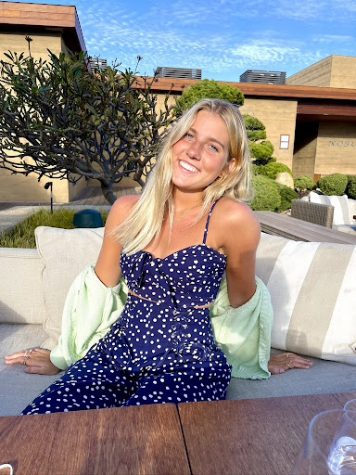Q&A with Dr. Danielle Black: Social Media and Teens

This is part of a series of stories aimed at examining the role social media plays in the lives of teenagers.
December 10, 2021
In another installment of #SocialIllusions, I had the opportunity to talk with licensed clinical psychologist Dr. Danielle Black about her thoughts on the impact that social media has on teenagers.
Dr. Black spoke last month at District 115’s first “Let’s Talk” program discussing the teenage brain and social media.
“Let’s Talk” was created to make a time and place for current topics to be discussed in our school community. If you missed the first talk you can find the recording here.
Do you think that social media, in general, is beginning to target teenagers?
“I think so, but that would be better answered by a tech person.
TikTok was created for children 18 and under. But if you are talking about the ins and outs of how they do it, you would need a tech person.
I think they are, however, because it is their main target audience.”
Do you think that social media does more harm than good regarding a person’s confidence?
“It depends.
The positive provides a community for people and a way to connect groups. A way to connect people with their friends, when they cannot see them – a creative outlet and such things we want to foster in teenagers.
The negatives are if a teen is using it with what research calls, “problematic usage.” This relates to all of the negatives: anxiety, depression, substance abuse- all the things we do not want to happen.
Something that stands out the most within the research is Passive VS Active.
Passive: I go on Instagram and scroll on my feed and do not even interact.
Active: I’m on Instagram, and I see my friends post and I say “You look great girl.” That’s positive because I purposefully interact with my friend’s content.
Other problematic use, correlated with the bad, is what we call Social Comparison. In some ways, it is human nature, but it is one of those things that can make depression worse, particularly for people who are depressed.
Can you blame social media for that? I don’t know. Some of it is building good habits, some of it is parents helping their kids develop a good relationship with social media.
It is not going away, it’s here to stay. It is a part of the fabric of our life. We need to teach teenagers how to use it appropriately.”
How do you suggest combating Social Comparison?
“The first step is to know when you are doing a social comparison and being aware.
Number two is understanding that social comparison is not healthy for you, it is natural to do, but just knowing that it’s not healthy. And the other step is knowing when it is not the time to engage in content, and follow content that will help you and not hinder you.
Whatever issue you have, follow accounts that will get you out of it and don’t follow what you think will get you more engaged in the negativity.
Building awareness to know how you are responding to the content. You have to notice “Is this content bringing up negative thoughts about myself? Or is this content making me feel better about myself?” A lot of it is about being self-aware.”
What is the best advice you have for teenagers on how to not dwell on the comparison and negatives?
“Fake it until you make it. If someone claims they have no insecurities then it’s an act.
It is a skill that you can develop: being aware, developing social awareness, and then trying to combat the negative self-talk with evidence against it. This is a very basic thing that I teach my clients all the time- a little easier to say than to do.
A thought is just a thought. It’s not a fact.
You can look at your thoughts and say, “I am going to have some curiosity about this thought, and then thinking, is this thought true, is this thought serving me. And if it’s not, then what can I do, and how can I act differently that is going to be helpful to me.
It can be learned, and I teach it all the time; I’ve even taught it to myself.
It’s all about healthy coping skills and teaching yourself how to have these skills. If you can’t teach it to yourself then you are not alone
It is basically developing emotional intelligence. And being able to understand this is the emotion that I’m feeling, and understand that there are thoughts that come from those emotions.”
How can you create a good relationship with social media?
“It’s a powerful medium and with that, people are having a struggle responding to that.
I think it is something you can build. If you know you’re in a bad mood, don’t consume content that’s likely to amplify the bad mood.
It takes some self-regulation and you kind of have to train yourself.
Like, if I know I am in a bad mood, engage in content that will make me feel better – and if I can’t do that, then it is probably not the best time to engage in the content.
As you get older you have more self-control and more insight, and maybe you mess up some times but you’ll realize, “now I’m going to work on that.” Parents need to be a little bit more involved earlier on, and as they get older, pull back on the control.
It needs to be this graduated independence so teens can engage with it in a way that’s healthy.”






